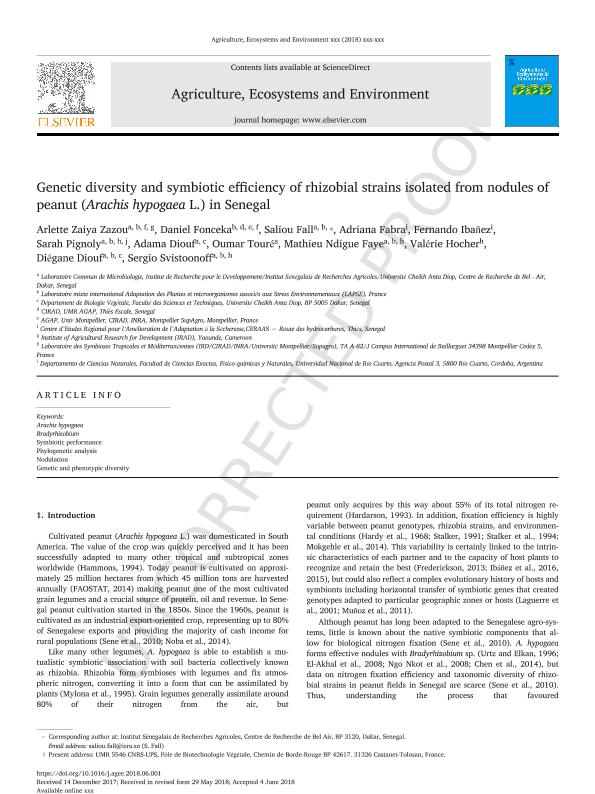Mostrar el registro sencillo del ítem
dc.contributor.author
Zaiya Zazou, Arlette
dc.contributor.author
Fonceka, Daniel
dc.contributor.author
Fall, Saliou
dc.contributor.author
Fabra, Adriana Isidora

dc.contributor.author
Ibañez, Fernando Julio

dc.contributor.author
Pignoly, Sarah
dc.contributor.author
Diouf, Adama
dc.contributor.author
Touré, Oumar
dc.contributor.author
Faye, Mathieu Ndigue
dc.contributor.author
Hocher, Valérie
dc.contributor.author
Diouf, Diégane
dc.contributor.author
Svistoonoff, Sergio
dc.date.available
2020-03-20T20:37:50Z
dc.date.issued
2018-10
dc.identifier.citation
Zaiya Zazou, Arlette; Fonceka, Daniel; Fall, Saliou; Fabra, Adriana Isidora; Ibañez, Fernando Julio; et al.; Genetic diversity and symbiotic efficiency of rhizobial strains isolated from nodules of peanut (Arachis hypogaea L.) in Senegal; Elsevier Science; Agriculture, Ecosystems and Environment; 265; 10-2018; 384-391
dc.identifier.issn
0167-8809
dc.identifier.uri
http://hdl.handle.net/11336/100518
dc.description.abstract
Cultivated peanut (Arachis hypogaea L.) was domesticated in South America. The value of the crop was quickly perceived and it has been successfully adapted to many other tropical and subtropical zones worldwide (Hammons, 1994). Today peanut is cultivated on approximately 25 million hectares from which 45 million tons are harvested annually (FAOSTAT, 2014) making peanut one of the most cultivated grain legumes and a crucial source of protein, oil and revenue. In Senegal peanut cultivation started in the 1850s. Since the 1960s, peanut is cultivated as an industrial export-oriented crop, representing up to 80% of Senegalese exports and providing the majority of cash income for rural populations (Sene et al., 2010; Noba et al., 2014). Like many other legumes, A. hypogaea is able to establish a mutualistic symbiotic association with soil bacteria collectively known as rhizobia. Rhizobia form symbioses with legumes and fix atmospheric nitrogen, converting it into a form that can be assimilated by plants (Mylona et al., 1995). Grain legumes generally assimilate around 80% of their nitrogen from the air, but peanut only acquires by this way about 55% of its total nitrogen requirement (Hardarson, 1993). In addition, fixation efficiency is highly variable between peanut genotypes, rhizobia strains, and environmental conditions (Hardy et al., 1968; Stalker, 1991; Stalker et al., 1994; Mokgehle et al., 2014). This variability is certainly linked to the intrinsic characteristics of each partner and to the capacity of host plants to recognize and retain the best (Frederickson, 2013; Ibáñez et al., 2016, 2015), but could also reflect a complex evolutionary history of hosts and symbionts including horizontal transfer of symbiotic genes that created genotypes adapted to particular geographic zones or hosts (Laguerre et al., 2001; Muñoz et al., 2011). Although peanut has long been adapted to the Senegalese agro-systems, little is known about the native symbiotic components that allow for biological nitrogen fixation (Sene et al., 2010). A. hypogaea forms effective nodules with Bradyrhizobium sp. (Urtz and Elkan, 1996; El-Akhal et al., 2008; Ngo Nkot et al., 2008; Chen et al., 2014), but data on nitrogen fixation efficiency and taxonomic diversity of rhizobial strains in peanut fields in Senegal are scarce (Sene et al., 2010). Thus, understanding the process that favoured peanut adaptation in Senegal by mining the extent of the diversity of the native strains found in peanut nodules and their efficiency in fixing atmospheric nitrogen is an important step to identify elite strains that can be used as potential inoculants to improve peanut productivity in Senegal through BNF. In this work, we studied the phenotypic and genetic diversity of rhizobia isolated from A. hypogaea grown in different agroecological zones in Senegal and compared these strains with efficient strains from Argentina and Zimbabwe.
dc.format
application/pdf
dc.language.iso
eng
dc.publisher
Elsevier Science

dc.rights
info:eu-repo/semantics/openAccess
dc.rights.uri
https://creativecommons.org/licenses/by-nc-sa/2.5/ar/
dc.subject
ARACHIS HYPOGAEA
dc.subject
BRADYRHIZOBIUM
dc.subject
GENETIC AND PHENOTYPIC DIVERSITY
dc.subject
NODULATION
dc.subject
PHYLOGENETIC ANALYSIS
dc.subject
SYMBIOTIC PERFORMANCE
dc.subject.classification
Otras Agricultura, Silvicultura y Pesca

dc.subject.classification
Agricultura, Silvicultura y Pesca

dc.subject.classification
CIENCIAS AGRÍCOLAS

dc.title
Genetic diversity and symbiotic efficiency of rhizobial strains isolated from nodules of peanut (Arachis hypogaea L.) in Senegal
dc.type
info:eu-repo/semantics/article
dc.type
info:ar-repo/semantics/artículo
dc.type
info:eu-repo/semantics/publishedVersion
dc.date.updated
2020-03-13T18:10:16Z
dc.journal.volume
265
dc.journal.pagination
384-391
dc.journal.pais
Países Bajos

dc.journal.ciudad
Amsterdam
dc.description.fil
Fil: Zaiya Zazou, Arlette. Université Cheikh Anta Diop; Senegal. Institute of Agricultural Research for Development; Camerún. Centre d’Etudes Régional pour l’Amélioration de l’Adaptation à la Sécheresse; Senegal
dc.description.fil
Fil: Fonceka, Daniel. Centre d’Etudes Régional pour l’Amélioration de l’Adaptation à la Sécheresse; Senegal. Institut National de la Recherche Agronomique; Francia
dc.description.fil
Fil: Fall, Saliou. Université Cheikh Anta Diop; Senegal
dc.description.fil
Fil: Fabra, Adriana Isidora. Consejo Nacional de Investigaciones Científicas y Técnicas. Centro Científico Tecnológico Conicet - Córdoba; Argentina. Universidad Nacional de Río Cuarto. Facultad de Ciencias Exactas Fisicoquímicas y Naturales; Argentina
dc.description.fil
Fil: Ibañez, Fernando Julio. Universidad Nacional de Río Cuarto. Facultad de Ciencias Exactas Fisicoquímicas y Naturales; Argentina. Consejo Nacional de Investigaciones Científicas y Técnicas. Centro Científico Tecnológico Conicet - Córdoba; Argentina
dc.description.fil
Fil: Pignoly, Sarah. Université Cheikh Anta Diop; Senegal. Institut National de la Recherche Agronomique; Francia. Centre National de la Recherche Scientifique; Francia
dc.description.fil
Fil: Diouf, Adama. Université Cheikh Anta Diop; Senegal
dc.description.fil
Fil: Touré, Oumar. Université Cheikh Anta Diop; Senegal
dc.description.fil
Fil: Faye, Mathieu Ndigue. Université Cheikh Anta Diop; Senegal. Institut National de la Recherche Agronomique; Francia
dc.description.fil
Fil: Hocher, Valérie. Université Montpellier; Francia. Institut National de la Recherche Agronomique; Francia
dc.description.fil
Fil: Diouf, Diégane. Université Cheikh Anta Diop; Senegal
dc.description.fil
Fil: Svistoonoff, Sergio. Institut National de la Recherche Agronomique; Francia. Université Cheikh Anta Diop; Senegal. Université Montpellier; Francia
dc.journal.title
Agriculture, Ecosystems and Environment

dc.relation.alternativeid
info:eu-repo/semantics/altIdentifier/doi/http://dx.doi.org/10.1016/j.agee.2018.06.001
dc.relation.alternativeid
info:eu-repo/semantics/altIdentifier/url/https://www.sciencedirect.com/science/article/abs/pii/S0167880918302299
Archivos asociados
